Clara W. Hunt, chair of the Children’s Librarians Section, had noted that the Newbery Medal provided children’s literature with “publicity of the best kind.” But ALA did not always rely on the Newbery’s popularity to capture the public’s attention. Publicity around the Newbery Medal has drummed up excitement amongst librarians, readers, and the public for the past century. Often this has meant events, press releases, newsletters, radio programming, television broadcasts, and newspaper and magazine articles. Even the medal’s donor, Fredric Melcher, was part of the pageantry by holding press conferences at his New York office to announce the awardee of the Newbery Medal. However, some publicity ideas were more daring than press conferences and radio programs. The two stories of Rachel Field and Misty the Horse highlight a couple out of the box stunts. Continue reading “100 Years of the Newbery: “Publicity of the Best Kind””
Author: Cara Bertram
100 Years of the Newbery: Letters from the Authors
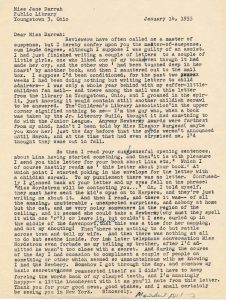
For a century, the American Library Association has honored children’s authors with the John Newbery Medal. From the earliest years of the award, its prestige was not lost upon the authors who received it. Letters written by awardees to the Newbery Medal Committee chairs reveal their excitement upon receiving the news.
In 1934, author Cornelia Meigs was selected for the Newbery for her book Invincible Louisa. Meigs wrote to the selection committee chair, Siri Andrews, and was delighted to have her book honored, acknowledging that the Invincible Louisa was in good company:
Your letter, with its very delightful and astonishing news, has given me much pleasure. The Newbery Medal is an award for which everyone has the most profound respect, so that I am fully sensible of what good fortune it is to me to have it offered to Invincible Louisa. Some such extraordinarily fine books have been on your list in the past that it seems a very impressive thing have an invitation extended to join that distinguished company.(1)
Continue reading “100 Years of the Newbery: Letters from the Authors”
100 Years of the Newbery: The First Medal
The John Newbery Medal, established in 1921 for “the most distinguished contribution to American literature for children,” celebrated its 100th anniversary last year and the centennial of its first award ceremony is quickly approaching.
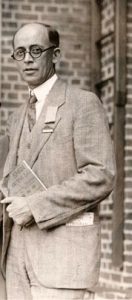
In 1921, Frederic Melcher, a publisher, bookseller, and chairman of the Children’s Book Week Committee, proposed the idea of a medal to be awarded in recognition of children’s literature and for it to be named after John Newbery, an 18th century British bookseller and children’s books publisher. With a growing audience for children’s books, more librarians being trained in children services, and the emergence of children’s book departments in publishing companies, the time seemed right for such an award and the idea gained traction.(1) Melcher paid to have the medal struck, while the Children’s Librarians Section (predecessor to the Association for Library Service to Children) organized the selection of the first winner through a vote of children’s librarians from across the country. Continue reading “100 Years of the Newbery: The First Medal”
Oral Histories at the ALA Archives
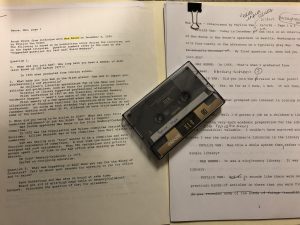
Alongside written records, photographs, and publications, the American Library Association Archives also holds over 150 interviews of individual librarians and library workers. These oral histories and interviews provide a vital resource of librarian recollections that may not be otherwise found in administrative records, photographs, and correspondence. These stories told by librarians and library workers provide context to their lives and career, how their experiences and education shaped their librarianship, and how certain events shaped their personal and professional lives.
While the ALA Archives does not currently have its own active oral history program, the Archives collects and supports projects that capture the voices of librarians and library workers as part of its mission to preserve the history of librarianship. Here is a small selection the oral history projects and interviews that the Archives holds: Continue reading “Oral Histories at the ALA Archives”
A Short History of ALA Headquarters
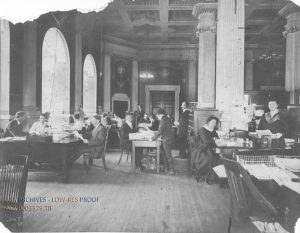
Last summer, the American Library Association moved from its long-lived location at 50 E. Huron Street in Chicago to its new location off Michigan Ave. This office were the longest held headquarters that ALA had, it was by no means the first nor was Chicago ALA’s original location. ALA’s history is filled with debates about locations and new homes.
According to Virgil F. Massman, the Association had several temporary homes in its early years, with the saying being that the Association was in Melvil Dewey’s desk drawer or wherever the ALA Secretary hung up their hat. In reality, ALA established headquarter offices at 32 Hawley Street in Boston in 1879, which were maintained by Melvil Dewey. (1) Continue reading “A Short History of ALA Headquarters”
Committee on the Status of Women in Librarianship
Blog post by Lauren Quinlan
Librarianship is a field that has long been dominated by women. According to a fact sheet published by the Department for Professional Employees, women compromise 81% of enrollment in graduate library science programs, 82.8% of all librarians, and 75.9% of all library workers [8]. However, this dominance in terms of numbers has historically not translated to true equity in other dimensions.
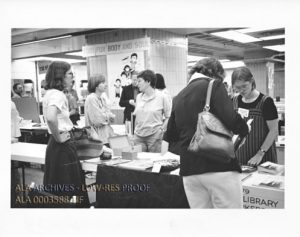
According to a 1967 study of academic librarians, median salary differences between male and female librarians tend to widen as experience in the field increases – even when levels of education between the two groups are equal [4]. This study emerged at a time when roughly four out of five librarians in the United States were female, and the discipline of librarianship was gaining legitimacy, with some concerned that “librarianship cannot upgrade itself without upgrading opportunities for women… Nor should it expect to gain the public esteem that it seeks by tactically endorsing inequality of opportunity, and furthering, by its own inaction, the all-too-familiar image of librarianship as a passive, unchallenging, and low-paid profession” [4]. Continue reading “Committee on the Status of Women in Librarianship”
50 Years of the Coretta Scott King Book Awards
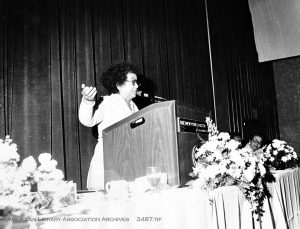
2019 marks the 50 year anniversary of the founding of the Coretta Scott King Book Awards. This book award commemorates the life and work of Dr. Martin Luther King, Jr., and honors his wife, Mrs. Coretta Scott King, for her courage and determination to continue the work for peace and world brotherhood. The award is given out every year to outstanding African American authors and illustrators of books for children and young adults that demonstrate an appreciation of African American culture and universal human values.(1)
It was founded by librarians Glyndon Flynt Greer and Mable McKissick, and publisher John Carroll during the 1969 American Library Association Annual Conference in Atlantic City. According to McKissick, “We [her and Greer] met at the booth of John Carroll. Since it was the day before the Newbery/Caldecott awards, the discussion turned to Black authors …”(2) and their lack of representation. It is reported that Carroll overhead the conversation and asked, “Then why don’t you ladies establish your own award?”(3) Continue reading “50 Years of the Coretta Scott King Book Awards”
Library Life: The Arthur Plotnik Photographs
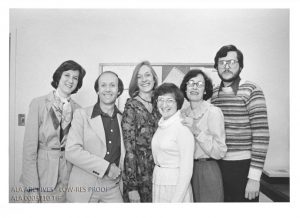
This spring, the American Library Association Archives acquired a generous donation of photographs from Arthur Plotnik, a photographer, journalist, writer, and librarian. Plotnik is the former editor of ALA’s flagship magazine, American Libraries, and his career with the American Library Association spanned over twenty years. Before coming to ALA, Plotnik worked at the H.W. Wilson Company, the Library of Congress, was a staff writer and reviewer at Albany’s Times-Union, and served in the US Army reserve. He is married to artist, Mary Phelan, who has claim to University of Illinois Library fame for her portraits of University Librarians Hugh Atkinson and Robert Downs. Continue reading “Library Life: The Arthur Plotnik Photographs”
Lotsee Patterson: Advocate for Library Services for Native Americans
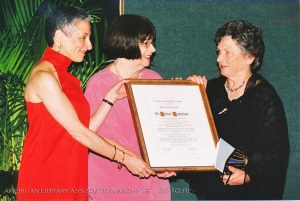
In 2005, the American Library Association announced that it was naming Dr. Lotsee Patterson as one of its honorary members, the Association’s highest honor. It is little wonder that the ALA gave this honor to Dr. Patterson given her lifelong passionate advocacy for quality library services and programs for Native Americans. Continue reading “Lotsee Patterson: Advocate for Library Services for Native Americans”
American Archives Month 2017

American Archives Month is upon us again, which mean it’s time to celebrate all things archives! At the American Library Association Archives, we’re celebrating by doing what we do best, working with archival collections! We’re busy processing new accessions that have come into the archives, such as the ALA Executive Director’s papers and materials on Banned Books Week. We’re also in the middle of a project to digitize large portions of the GLBT Round Table archives. And we’re always in the process of answering your questions that have come in via email, phone, and in person.
Join in on American Archives Month by asking a reference question at a local archives or archival repository, browse the National Archives website, follow an archives on social media (we have all the best photos!), or join us for #AskAnArchivist Day on Twitter! Continue reading “American Archives Month 2017”